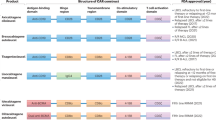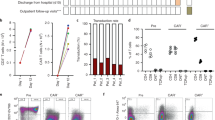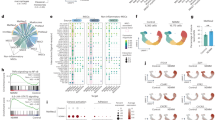Abstract
Graft failure (GF) remains a major complication of cord blood transplantation (CBT). Although the presence of pretransplant, donor-specific anti-HLA antibodies (DSA) was reported to be associated with an increased risk of GF after CBT, data are still limited. Thus, we conducted a retrospective analysis of recipients of single-unit CBT with pretransplant anti-HLA antibodies using the database of Japan Society for Hematopoietic Cell Transplantation (JSHCT). Data for recipients of single-unit CBT with pretransplant anti-HLA antibodies from 2010 to 2014 were obtained. In total, 343 patients who received CBT and who had detailed information about anti-HLA antibodies were included. The median age was 51 years (range, 0–71). Regarding DSA, 25 patients had a mean fluorescence intensity (MFI) ≥ 1000 (DSA-positive group) and 318 patients had a MFI <1000 (DSA-negative group). The cumulative incidence of neutrophil engraftment at 60 days after CBT was 75.7% (95% CI, 70.6–80.1) in the DSA-negative group and 56.0% (95% CI, 34.1–73.1) in the DSA-positive group (P = 0.03). In conclusion, pretransplant DSA with a MFI ≥ 1000 was associated with an increased risk of GF in single-unit CBT.
This is a preview of subscription content, access via your institution
Access options
Subscribe to this journal
Receive 12 print issues and online access
$259.00 per year
only $21.58 per issue
Buy this article
- Purchase on Springer Link
- Instant access to full article PDF
Prices may be subject to local taxes which are calculated during checkout


Similar content being viewed by others
References
Ozdemir ZN, Civriz Bozdag S. Graft failure after allogeneic hematopoietic stem cell transplantation. Transfus Apher Sci. 2018;57:163–7.
Rocha V, Labopin M, Sanz G, Arcese W, Schwerdtfeger R, Bosi A, et al. Transplants of umbilical-cord blood or bone marrow from unrelated donors in adults with acute leukemia. N Engl J Med. 2004;351:2276–85.
Atsuta Y, Suzuki R, Nagamura-Inoue T, Taniguchi S, Takahashi S, Kai S, et al. Disease-specific analyses of unrelated cord blood transplantation compared with unrelated bone marrow transplantation in adult patients with acute leukemia. Blood. 2009;113:1631–8.
Anasetti C, Logan BR, Lee SJ, Waller EK, Weisdorf DJ, Wingard JR, et al. Peripheral-blood stem cells versus bone marrow from unrelated donors. N Engl J Med. 2012;367:1487–96.
Nakasone H, Tabuchi K, Uchida N, Ohno Y, Matsuhashi Y, Takahashi S et al. Which is more important for the selection of cord blood units for haematopoietic cell transplantation: the number of CD34-positive cells or total nucleated cells? Br J Haematol. 2019.185:166–9.
Nakasone H, Fuji S, Yakushijin K, Onizuka M, Shinohara A, Ohashi K, et al. Impact of total body irradiation on successful neutrophil engraftment in unrelated bone marrow or cord blood transplantation. Am J Hematol. 2017;92:171–8.
Rondon G, Saliba RM, Khouri I, Giralt S, Chan K, Jabbour E, et al. Long-term follow-up of patients who experienced graft failure postallogeneic progenitor cell transplantation. Results of a single institution analysis. Biol Blood Marrow Transpl. 2008;14:859–66.
Fuji S, Nakamura F, Hatanaka K, Taniguchi S, Sato M, Mori S, et al. Peripheral blood as a preferable source of stem cells for salvage transplantation in patients with graft failure after cord blood transplantation: a retrospective analysis of the registry data of the Japanese Society for Hematopoietic Cell Transplantation. Biol Blood Marrow Transpl. 2012;18:1407–14.
Ciurea SO, Thall PF, Milton DR, Barnes TH, Kongtim P, Carmazzi Y, et al. Complement-binding donor-specific anti-HLA antibodies and risk of primary graft failure in hematopoietic stem cell transplantation. Biol Blood Marrow Transpl. 2015;21:1392–8.
Takanashi M, Atsuta Y, Fujiwara K, Kodo H, Kai S, Sato H, et al. The impact of anti-HLA antibodies on unrelated cord blood transplantations. Blood. 2010;116:2839–46.
Ciurea SO, de Lima M, Cano P, Korbling M, Giralt S, Shpall EJ, et al. High risk of graft failure in patients with anti-HLA antibodies undergoing haploidentical stem-cell transplantation. Transplantation. 2009;88:1019–24.
Ruggeri A, Rocha V, Masson E, Labopin M, Cunha R, Absi L, et al. Impact of donor-specific anti-HLA antibodies on graft failure and survival after reduced intensity conditioning-unrelated cord blood transplantation: a Eurocord, Societe Francophone d’Histocompatibilite et d’Immunogenetique (SFHI) and Societe Francaise de Greffe de Moelle et de Therapie Cellulaire (SFGM-TC) analysis. Haematologica. 2013;98:1154–60.
Cutler C, Kim HT, Sun L, Sese D, Glotzbecker B, Armand P, et al. Donor-specific anti-HLA antibodies predict outcome in double umbilical cord blood transplantation. Blood. 2011;118:6691–7.
Gladstone DE, Bettinotti MP. HLA donor-specific antibodies in allogeneic hematopoietic stem cell transplantation: challenges and opportunities. Hematol Am Soc Hematol Educ Program. 2017;2017:645–50.
Yamamoto H, Uchida N, Matsuno N, Ota H, Kageyama K, Wada S, et al. Anti-HLA antibodies other than against HLA-A, -B, -DRB1 adversely affect engraftment and nonrelapse mortality in HLA-mismatched single cord blood transplantation: possible implications of unrecognized donor-specific antibodies. Biol Blood Marrow Transpl. 2014;20:1634–40.
Ciurea SO, Cao K, Fernadez-Vina M, Kongtim P, Malki MA, Fuchs E, et al. The European Society for Blood and Marrow Transplantation (EBMT) consensus guidelines for the detection and treatment of donor-specific anti-hla antibodies (DSA) in haploidentical hematopoietic cell transplantation. Bone Marrow Transpl. 2018;53:521–34.
Kanda Y. Investigation of the freely available easy-to-use software ‘EZR’ for medical statistics. Bone Marrow Transpl. 2013;48:452–8.
Ciurea SO, Thall PF, Wang X, Wang SA, Hu Y, Cano P, et al. Donor-specific anti-HLA Abs and graft failure in matched unrelated donor hematopoietic stem cell transplantation. Blood. 2011;118:5957–64.
Hefazi M, Hogan WJ, Wakefield LL, Gandhi MJ. The association of de novo anti-HLA-DPB1 donor-specific antibody formation and primary graft failure after allogeneic hematopoietic cell transplantation. Hum Immunol. 2018;79:861–4.
Spellman S, Bray R, Rosen-Bronson S, Haagenson M, Klein J, Flesch S, et al. The detection of donor-directed, HLA-specific alloantibodies in recipients of unrelated hematopoietic cell transplantation is predictive of graft failure. Blood. 2010;115:2704–8.
Brunstein CG, Noreen H, DeFor TE, Maurer D, Miller JS, Wagner JE. Anti-HLA antibodies in double umbilical cord blood transplantation. Biol Blood Marrow Transpl. 2011;17:1704–8.
Stiff PJ, Montesinos P, Peled T, Landau E, Goudsmid NR, Mandel J, et al. Cohort-controlled comparison of umbilical cord blood transplantation using carlecortemcel-L, a single progenitor-enriched cord blood, to double cord blood unit transplantation. Biol Blood Marrow Transpl. 2018;24:1463–70.
Horwitz ME, Wease S, Blackwell B, Valcarcel D, Frassoni F, Boelens JJ, et al. Phase I/II study of stem-cell transplantation using a single cord blood unit expanded ex vivo with nicotinamide. J Clin Oncol. 2019;37:367–74.
Acknowledgements
This study was supported by Health, Labour and Welfare Science Grants for Research on Measures for Rare and Intractable Diseases from the Japanese Government.
Author information
Authors and Affiliations
Contributions
SF, KO and MO designed the research, analyzed data, and wrote the paper. KO, MS, TS, TE, MT, MO, HN, SS, YO, MH, TN-I, HT, TF provided data. All authors have read the manuscript and consented to submission.
Corresponding author
Ethics declarations
Conflict of interest
The authors declare that they have no conflict of interest.
Additional information
Publisher’s note Springer Nature remains neutral with regard to jurisdictional claims in published maps and institutional affiliations.
Rights and permissions
About this article
Cite this article
Fuji, S., Oshima, K., Ohashi, K. et al. Impact of pretransplant donor-specific anti-HLA antibodies on cord blood transplantation on behalf of the Transplant Complications Working Group of Japan Society for Hematopoietic Cell Transplantation. Bone Marrow Transplant 55, 722–728 (2020). https://doi.org/10.1038/s41409-019-0712-0
Received:
Revised:
Accepted:
Published:
Issue Date:
DOI: https://doi.org/10.1038/s41409-019-0712-0
This article is cited by
-
Effects of donor-specific antibodies on engraftment and long-term survival after allogeneic hematopoietic stem cell transplantation—A systematic review and meta-analysis
Bone Marrow Transplantation (2023)
-
Improved trends in survival and engraftment after single cord blood transplantation for adult acute myeloid leukemia
Blood Cancer Journal (2022)
-
Successful desensitization of high level donor-specific anti-HLA antibody in patients with hematological diseases receiving haploidentical allografts
Annals of Hematology (2022)
-
Outcomes of salvage haploidentical transplantation using posttransplant cyclophosphamide for graft failure following allogeneic hematopoietic stem cell transplantation
International Journal of Hematology (2022)
-
Comparison of immunosuppressant regimens in salvage cord blood transplantation for graft failure after allogeneic hematopoietic stem cell transplantation
Bone Marrow Transplantation (2021)



